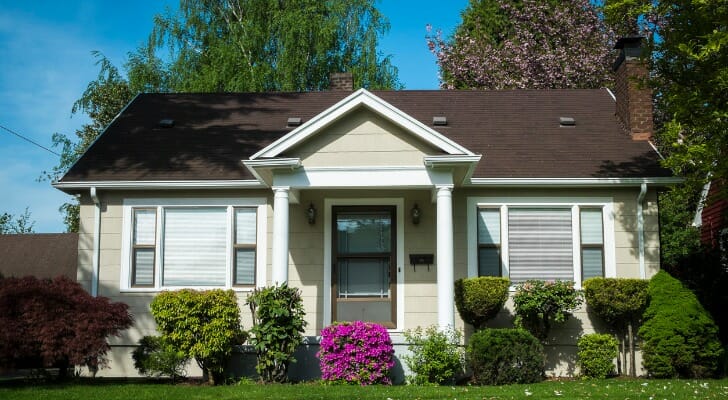While most homebuyers use a mortgage to finance their purchase, some have the liquidity to buy with cash. Paying cash can save significant money on interest and speed up the closing process. However, there are other factors to consider before deciding on a cash purchase. If you’re preparing to buy a home, a financial advisor can help you develop a financial plan aligned with your mortgage needs and long-term goals.
Buying a Home With Cash
The U.S. Census said that the median sales price for new homes sold in September 2024 was $426,300. For comparison, the average sales price during the same period was $510,000. With home prices booming, it might seem that few buyers could afford to pay cash for a home. However, studies have shown that just over 1/3 of home purchases are completed with cash.
Paying cash for a home offers unique advantages compared to the traditional approach of securing a mortgage. However, the benefits aren’t always straightforward, and for some buyers, financing may actually be the smarter choice. Before proceeding with a cash purchase, it’s essential to weigh the pros and cons. This can help you determine if it aligns with your financial goals.
Pros of Paying Cash for a Home
A buyer paying cash for a home doesn’t need to go through the tedious and time-consuming process of loan approval. Instead of waiting weeks to close and take possession, a cash buyer could be moving in within days. Besides saving time, here are the most important pros of buying a home with cash:
- Sells prefer cash: Paying cash is more attractive to sellers. This is because there’s no worry about a financing problem causing the deal to fall through. Sellers may even be inclined to give a cash discount. In a competitive situation, a seller may take an all-cash bid that’s lower over a higher bid that requires a mortgage.
- Save on fees: In addition to a potentially lower purchase price, a cash buyer saves money on closing costs. There’s no need for a loan origination fee or discount points.
- No interest payments: The biggest financial benefit is not having to pay interest and, to say the least, it’s significant. Buying a home at the September 2024 median sales price of $426,300 with 20% down and a 4% interest rate would cost $244,687 in interest over 30 years, according to SmartAsset’s free mortgage calculator.
- Benefits those with a fixed income: The cash buyer would also not be required to make 360 monthly mortgage payments. For this reason, people may consider paying cash when they are approaching retirement and will be on a fixed income.
- Own the property outright: A cash buyer doesn’t have to worry about getting trapped in an underwater mortgage if the housing market declines. And there’s no mortgage company dictating how much hazard insurance has to be carried.
Cons of Paying Cash for a Home

While paying cash for a home may sound like the perfect opportunity because of how much money you could save over the period of time you’ll own the home, there are other considerations. Here are the biggest cons to buying a home with cash:
- Missed investment opportunities: Opportunity cost is an important factor for cash buyers to consider. Capital tied up in a home is capital that can’t be invested elsewhere. From an investment standpoint, committing a large portion of funds to a single asset reduces portfolio diversification, potentially increasing risk.
- Earnings potential may exceed savings: Choosing to finance a home instead of paying in full with cash allows buyers to invest their capital in other avenues, such as a business or the stock market, which have historically delivered higher returns than residential real estate. Additionally, a more diversified portfolio can help mitigate risk.
- Cash is tied up in the house: Cash used to pay for the home won’t be available for any future financial need such as college, retirement, illness or disability. And if a buyer restricts home selections to only those priced low enough to buy with cash, it may mean getting a smaller or less well-appointed place.
- Still need to pay for property expenses: A further factor is that paying cash doesn’t mean no payments at all. People who own their homes free and clear still need sufficient cash flow to pay property taxes and insurance premiums.
- No tax benefits: Finally, cash buyers may lose tax benefits for mortgage interest deductions. These benefits are less relevant since the 2017 Tax Cuts and Jobs Act restricted mortgage interest deductions and increased the standard deduction, however. The Urban-Brookings Tax Policy Center estimated that only half as many tax returns claim mortgage interest deductions since the passage of the tax law.
How to Buy With Cash
If a cash purchase seems feasible, it’s best not to spend all available cash on the home. Experts advise keeping three to six months’ worth of expenses in an emergency fund. The source of the cash also matters. Withdrawing from a retirement fund can trigger tax consequences that could make the cash purchase much more expensive than anticipated.
As noted, taxes, as well as insurance and any homeowners’ association payments, also need to be budgeted for. So make sure you’ll have enough cash flow to cover those. Once a home has been selected, get it inspected by a licensed inspector even though it’s not required as it would be by a mortgage lender. The same goes for a title search, title insurance policy and survey.
When the time comes for the closing, don’t show up with a suitcase of cash. Title companies don’t want cash. Instead, use a cashier’s check or, preferably, a wire transfer to pay. Once you advise the professionals involved in the transaction that you’re paying in cash then they should give you instructions on how to make the payment on the day of closing.
Bottom Line

Paying cash for a home can save significant amounts of interest while also potentially reducing future flexibility and posing opportunity costs. The decision to pay cash or take out a loan requires balancing several pros and cons, including personal preference. Many people can actually earn more from investing the money into other investments than it would cost them to get a mortgage.
Tips for Buying a Home
- A financial advisor can be a great resource in your home buying journey and can offer advice on how it fits into your financial plan. Finding a qualified financial advisor doesn’t have to be hard. SmartAsset’s free tool matches you with up to three financial advisors who serve your area, and you can interview your advisor matches at no cost to decide which one is right for you. If you’re ready to find an advisor who can help you achieve your financial goals, get started now.
- If you’ve decided to get a mortgage to buy a residence instead of paying cash, then this mortgage calculator will let you know what your monthly payments will be.
Photo credit: ©iStock.com/Feverpitched, ©iStock.com/RobertCrum, ©iStock.com/Feverpitched
